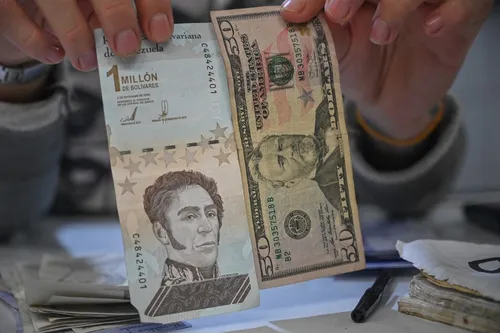
The Central Bank of Venezuela announced this Tuesday (9) that monthly inflation in March in the country was 1.2%. The data repeats the performance of the previous month, when it was also 1.2% and had been, until then, the lowest inflation in the last 12 years.
According to Venezuelan President Nicolás Maduro, accumulated inflation for 2024 is 4.1% in the first four months of the year. During the broadcast of your program With Maduro + on Monday, he celebrated the result. “These are positive, solid economic indicators, which we achieved with courage, with our own effort, with sanctions, because the sanctions were never lifted, on the contrary, they threaten more sanctions,” he said.
He stated that the work to reduce inflation was a collective effort that shows an economic recovery in Venezuela.
According to the Central Bank, inflation for the month was driven by the health sectors (1.6%), clothing and footwear, food and non-alcoholic beverages and goods and services (1.3%)
The positive results will be used by the government with just over three months to go before the elections, scheduled for July 28th. Since the beginning of the year, Maduro has been talking about 5% GDP growth in 2023 and the goal of lowering inflation. Although the Central Bank does not disclose the inflation accumulated over 12 months, private opposition institutes estimate that annualized inflation is at 89%.
In January 2019, Venezuela recorded a monthly rate of 196.6%, the highest in the historical series that began in 2007. Maduro said in January that Venezuela “will consolidate its definitive victory against inflation by returning, with the help of God , to double-digit annual inflation”.
Venezuela’s economic data is directly impacted by the sanctions imposed by the United States on Venezuelan companies. The main one is against oil companies. In October 2023, after the government and opposition signed an agreement in Barbados defining what the 2024 elections would be like, the United States temporarily lifted some sanctions, with special licenses.
The main one is license 44, which talks precisely about permission to sell oil, the main product exported by Venezuela. The license will expire on April 18 and could change the pace of the country’s economic growth this year.
After the Venezuelan court confirmed the disqualification of María Corina Machado, in January 2024, the United States began to threaten the resumption of sanctions. In a post on the social network X, US State Department spokesman Matthew Miller said that the country began reviewing relief to Venezuela after the TSJ announcement.
Also according to the US government, relief for the oil and gas sector in Venezuela will only be renewed in April if the Venezuelan government “complies with its agreements”.
The Barbados agreement determined that the elections would be held in the second half of the year and would include observation missions from the European Union, the Carter Center and the United Nations (UN). In addition to announcing the date of the elections, the CNE invited the Community of Latin American and Caribbean States (Celac), the Caribbean Community (Caricom), the African Union, the European Union, UN experts, BRICS and the Carter Center of the United States to observe the 2024 elections in the country.
Editing: Rodrigo Durão Coelho

Source: www.brasildefato.com.br

